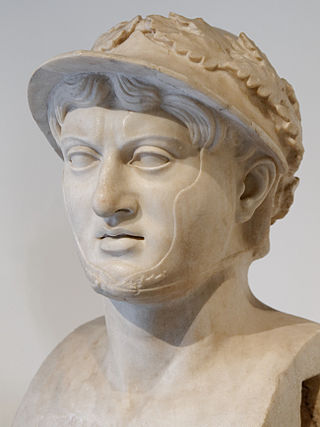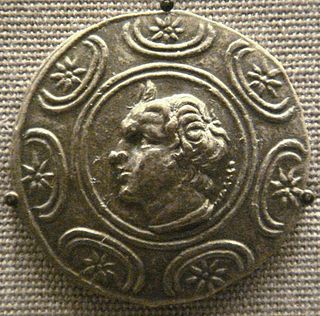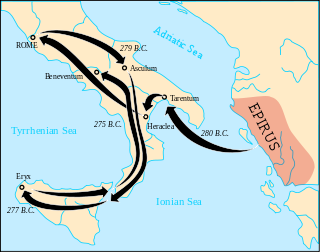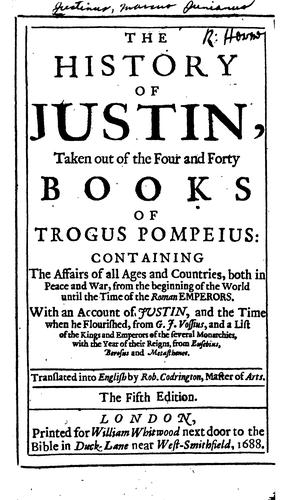This article needs additional citations for verification .(November 2024) |
| Helenus | |
|---|---|
| House | Aeacidae |
| Father | Pyrrhus I of Epirus |
| Mother | Bircenna |
| Religion | Ancient Greek religion |
Helenus was a prince of Epirus during the Hellenistic period.
This article needs additional citations for verification .(November 2024) |
| Helenus | |
|---|---|
| House | Aeacidae |
| Father | Pyrrhus I of Epirus |
| Mother | Bircenna |
| Religion | Ancient Greek religion |
Helenus was a prince of Epirus during the Hellenistic period.
He was a son of King Pyrrhus of Epirus and his fourth wife, Bircenna, daughter of Bardylis II of Illyria. Helenus was the youngest of Pyrrhus' sons. [1]
At a very young age he accompanied his father on his ambitious campaign in Italy. [2] It is thought that Pyrrhus, pleased with his successes in Sicily, intended to install his son there as king. However, the tide of fortune changed. When Pyrrhus was forced to abandon both Sicily and Italy, he left Helenus at Taranto, with Milona at the head of the garrison left there, to guard the only city left in his power. [3] Some time later he recalled them to the homeland, because of the new opportunities for expansion that presented themselves in Macedonia and Southern Greece.
Helenus accompanied his father in the campaign he carried out in the Peloponnese in 272 BC. After the fatal night attack on Argos, which cost Pyrrhus his life, Helenus fell into the hands of Antigonus Gonatas, who, however, treated him with magnanimity and the honors befitting his position. He finally sent him safely back to Epirus, where he carried his father's remains. [4]

Alexander I of Epirus, also known as Alexander Molossus, was a king of Epirus (343/2–331 BC) of the Aeacid dynasty. As the son of Neoptolemus I and brother of Olympias, Alexander I was an uncle, and a brother-in-law, of Alexander the Great. He was also an uncle to Pyrrhus of Epirus.

In Greek mythology, Neoptolemus, originally called Pyrrhus at birth, was the son of the mythical warrior Achilles and the princess Deidamia, and the brother of Oneiros. He became the progenitor of the ruling dynasty of the Molossians of ancient Epirus. In a reference to his pedigree, Neoptolemus was sometimes called Achillides or, from his grandfather's or great-grandfather's names, Pelides or Aeacides.

Justin was a Latin writer and historian who lived under the Roman Empire.

Pyrrhus was a Greek king and statesman of the Hellenistic period. He was king of the Molossians, of the royal Aeacid house, and later he became king of Epirus. He was one of the strongest opponents of early Rome, and had been regarded as one of the greatest generals of antiquity. Several of his victorious battles caused him unacceptably heavy losses, from which the phrase "Pyrrhic victory" was coined.

Antigonus II Gonatas was a Macedonian Greek ruler who solidified the position of the Antigonid dynasty in Macedon after a long period defined by anarchy and chaos and acquired fame for his victory over the Gauls who had invaded the Balkans.
Artabanus of Persia was a Persian political figure during the Achaemenid dynasty who was reportedly Regent of Persia for a few months.

Antigonus III Doson was king of Macedon from 229 BC to 221 BC. He was a member of the Antigonid dynasty. He was called Euergetes, Soter and Guardian (ἐπίτροπος) as he was the guardian of Philip V of Macedon.

Philetaerus was the founder of the Attalid dynasty of Pergamon in Anatolia.

The Pyrrhic War was largely fought between the Roman Republic and Pyrrhus, the king of Epirus, who had been asked by the people of the Greek city of Tarentum in southern Italy to help them in their war against the Romans.

Alexandria on the Indus was a city founded by Alexander the Great at the junction of the Indus and the Acesines river. Arrian tells that colonists, mainly Thracian veterans and natives, were settled there.

The gens Pompeia was a plebeian family at ancient Rome, first appearing in history during the second century BC, and frequently occupying the highest offices of the Roman state from then until imperial times. The first of the Pompeii to obtain the consulship was Quintus Pompeius in 141 BC, but by far the most illustrious of the gens was Gnaeus Pompeius, surnamed Magnus, a distinguished general under the dictator Sulla, who became a member of the First Triumvirate, together with Caesar and Crassus. After the death of Crassus, the rivalry between Caesar and Pompeius led to the Civil War, one of the defining events of the final years of the Roman Republic.
Ptolemy, king of Epirus was the second son of Alexander II, king of Epirus, and Olympias, grandson of the great Pyrrhus and brother of Phthia of Macedon. He was named in honour of his late uncle Ptolemy. He succeeded to the throne on the death of his elder brother, Pyrrhus II of Epirus, but reigned only a very short time, having set out on a military expedition, during the course of which he fell sick and died or, according to Polyaenus, he was treasonably assassinated. The date of his reign cannot be fixed with certainty, but as he was a contemporary of Demetrius II, king of Macedonia, it may be placed between 239 and 229 BC. He was succeeded by Deidamia II or Pyrrhus III.
Nicomedes III Euergetes was the king of Bithynia, from c. 127 BC to c. 94 BC. He was the son and successor of Nicomedes II of Bithynia.
Bircenna was an Illyrian princess and later an Epirote queen.

Zopyrion was a Macedonian general.
Socrates Chrestus was the second son of Nicomedes III of Bithynia. He usurped the Bithynian throne by deposing his elder brother or half brother, Nicomedes IV of Bithynia.
Olympias was a Greek queen consort and regent of Epirus.
Deidamia was a Princess of Epirus.
The gens Perpernia, also found as Perpennia, was a plebeian family of Etruscan descent at ancient Rome. Members of this gens first appear in history during the second century BC, and Marcus Perperna obtained the consulship in 130 BC.

The Epitome of the Philippic History of Pompeius Trogus by the second-century Roman writer Justin is an abridgment of the Augustan historian Pompeius Trogus' lengthy work the Historiae Philippicae, which has not survived. Justin's epitome is the only surviving source for Trogus' original work.